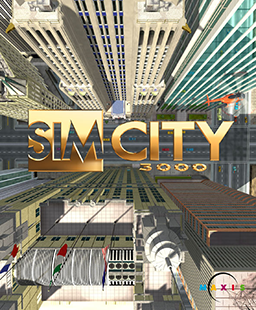Big post to catch up, couldn't post last two days, so here's three games at once (bear with me, wall of text), and a hint for the one tomorrow.
#26
'SimCity 3000'
for the PC released in 1999.


A city builder that widened my horizon. Not only figuratively, but also literally. The game was quite complicated for it's time and could really suck the player in for hours. 'SimCity 3000' made me conscious of the task of planning cities and neighbourhoods and managing everything well enough. I wouldn't call it an educational game of course, but it did provide me with both fun and knowledge and had a big impact on what interests me in real life.
'SimCity 3000' wasn't the first game in the franchise I played, that honour goes to it's predecessor; 'SimCity 2000', and I had also played the very first SimCity before I got into '3000'. Naturally, the game is all about building a city. As big as possible. Zoning residential areas, commercial areas and industrial areas. Providing them with roads, electricity and water and construction things like schools, police stations and leisure facilities.
Many hours have been sunk into this game, but moreso on it's superior successor. The biggest city I ever made in this game had about 400k inhabitants. Big, but not monstrous like some I've seen on the internet. I've always wanted to be able to make things bigger than a single city, to be able to create a whole country of cities. Sadly that wasn't given to me by this game, but luckily...
#25
'The Legend of Zelda: Majora's Mask'
for the Nintendo 64 released in 2000.


The second entry in this list for my favourite franchise is 'Majora's Mask'. It's a bit of the black-sheep of the Zelda series, though another entry in the series could also get that title. Straying away from the 'normal' Zelda formula and story, 'Majora's Mask' focusses a bit more on the human aspect of the Zelda world and plays into your fear and depression with it's dark and mysterious and often creepy tone.
The game is one of the original ones, and the story and the way the main gameplay mechanic, those of the masks and the time system, plays into it was flawless. For the rest, the game follows what's been done so excellently in the Zelda series. The game features some ingenious dungeons, and cool use of items as wel as lots of stuff to explore. The game's probably most famous for it's extensive side-quests.
The game also pushed the N64 to it's technical limits. A next-gen system was already out, the SEGA Dreamcast, and the second was on it's way, the PlayStation 2, so the Nintendo had something to show with this game. It certainly didn't fail to impress. With the extra RAM of the expansion pack, the system could pump out some seriously beautiful games in the later part of it's life. Us Europeans were extra lucky, because we also got a stunning box-art, which I would consider one of the best ever made!
#24
'Asterix'
for the PlayStation released in 1999.


'Asterix' for PlayStation is quite an unexpected game to pop up in such a list, because I don't think the creators's ambition for this game was ever to make one of 'best games of all-time'. It's a simple game, modelled a bit after the board-game 'Risk' with some platforming mini-games in between. However, the game takes out all the unnecessary stuff, and molds it into a simple-to-understand package.
That's probably what makes the game so good, it's simple yet fun and addicting. Don't let the game fool you with it's kiddie Asterix exterior though. It will actually get quite challenging. Like in Risk, the objective is to conquer land. In this case, conquer Gaul, or France, back from the Romans who took it. The more you advance towards Italy, the more powerful Roman defences become.
To do this, you must fortify regions you own with soldiers represented as the famous kettle containing magic potion. You get a certain number of reinforcements each turn to distribute as you choose. The player also uses these to attack Roman camps in enemy provinces and battles are then automated like Risk's roll of the dice. Sometimes however, a region would contain a mini-game. These are often little levels in 2D platformer-style where the player simply needs to reach the end of the level to conquer the province, which is a nice change of pace.
#23 Hint:
Phew. Lot's of words so I'll make this clue a short one. This game in a famous franchise took the series to an even darker and more ominous place, where the player often had to run for the more powerful (yet very familiar) enemy.

















